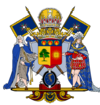1731 Shirerithian general elections
| |||||||
| |||||||
| Turnout Adelsraad: None (postponed) Turnout Folksraad: None (postponed) | |||||||
| |||||||
The 1731 Shirerithian general elections were planned elections in the Imperial Republic of Shireroth, scheduled to fill seats in both the Folksraad (representing the common people) and the Adelsraad (representing the lower nobility). However, these elections (much like the 1729 Shirerithian general elections before), were postponed, this time indefinitely due to the eruption of the Sathrati Emergency, a major conflict that plunged Shireroth into turmoil.
While postponing elections was initially met with little resistance due to the urgency of the situation, the growing dissatisfaction would later manifest during the Streïur uis Faïren. The outbreak of war, the nuclear detonations, the loss of coalition partners for the Second Thuylemans Government, and events like the Novi Nigrad Quarrels of 1734 AN, ultimately forcing the ruling government to schedule the 1735 Shirerithian general elections as a way to restore order and address the brewing political crisis.
Background
The Sathrati Emergency, which had begun in late 1730 AN, was a conflict of critical importance to the empire, involving the defense of Shireroth against external and internal threats. The Thuylemans Cabinet, led by Louis Thuylemans, responded to the emergency by invoking emergency powers and postponing the 1731 elections, which had been planned to refresh both the Folksraad and Adelsraad. As the crisis deepened, Thuylemans' government postponed the 1731 general elections as well, citing the need to maintain stability and unity in the face of the war.
At the time, the postponement was seen as a necessary move. The Sathrati war consumed the attention of both the political elite and the general public, allowing Thuylemans to consolidate power and rally the Shirerithian people behind the war effort. Thuylemans positioned himself as a protector of the realm, gaining widespread support for his leadership, especially among the nobility and military factions. The idea of holding elections during such a critical period seemed unrealistic, and there was little public opposition to the delay. In the East, where one was used to decision making by the Court, the autocratic approach was even lauded by several noble families. Criticism in the West, among the Batavian elite, grew, however.
Postponement of Elections and Impact
As the conflict continued and the government clung to its emergency powers, the lack of representation became a sore point for many. This disenfranchisement was particularly felt in the Folksraad, where commoners had no voice in the affairs of state while their lives were heavily impacted by the war against the Benacian Union and the economic consequences of prolonged military campaigns.
The Adelsraad, which represented the lower nobility, also saw growing divisions, as many nobles grew frustrated with their exclusion from political decision-making. The postponement further deepened the rift between moderates who supported the continued rule of Thuylemans for the sake of stability and radicals who sought a return to a constitutional framework, potentially even reforms to increase democratic representation (the ideals of representation was certainly not limited to the common folk).
By the time the Novi Nigrad Quarrels erupted in 1734, Shireroth was ripe for political upheaval. These violent clashes, spurred by frustration over the government’s failure to hold elections, were one of the final sparks that pushed the Thuylemans Cabinet to concede to holding new elections in 1735 AN. Under their own terms and conditions, of course.
| |||||||||||||||||||||||||||||||||||||

